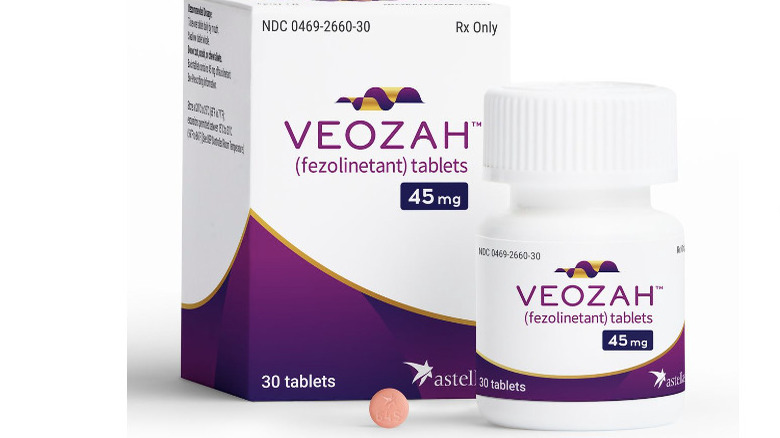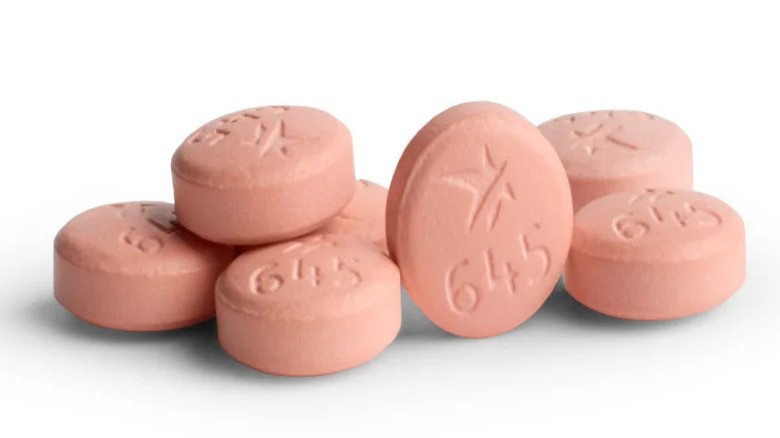The Veozah Commercial Explained: Drug Uses, Side Effects, And More
Do you suffer from the internal, spontaneous combustion sensation called hot flashes? You probably took note of the Super Bowl ad for Veozah, the brand name for the drug fezolinetant, which is used to reduce hot flashes and night sweats due to menopause. The 60-second ad aired just before kickoff and begins with a woman opening the freezer to feel relief from her hot flash, followed by other women smiling as they became free from hot flashes. The ad uses the slogan, "Fewer hot flashes, more not flashes." A "not flash" moment is free from a hot flash.
This is the second year in a row that pharmaceutical company Astellas Pharma has brought awareness of menopause symptoms to its Super Bowl audience. Last year's 30-second spot asked several women the question, "What is VMS?" which is short for vasomotor symptoms, aka, hot flashes. At that time, Veozah was still finishing up its clinical trials. In May 2023, the Food and Drug Administration approved Veozah as a hormone-free option for dealing with menopause symptoms. The 2024 ad jumped past the introductions, and instead, focused on explaining how the drug can turn those hot flashes into what they term 'not flashes.'
What does Veozah do?
Veozah treats vasomotor symptoms (VMS), which are more commonly known as hot flashes. VMS is the most common symptom during menopause when a formerly menstruating person's estrogen levels begin to fluctuate. When estrogen levels begin to decline, the body's internal thermostat becomes overly sensitive. This causes a sudden flush of heat in the upper body, as well as mild to severe sweating. Several hot flashes can easily disrupt your day, and hot flashes at night can keep you awake.
Astellas Pharma's Veozah acts in the brain to lower the intensity and frequency of hot flashes during menopause by blocking a substance called neurokinin B.This helps the brain to better regulate body temperature, thereby reducing the overall intensity of hot flash symptoms. According to drug manufacturer Astellas, a person could begin seeing the effects of Veozah after one week. The company also notes that per its own clinical trials, after 12 weeks, women who took Veozah reported that they experienced 63% fewer hot flashes. Veozah is specifically designed for people experiencing hormonal changes due to menopause.
Veozah's side effects
Although Veozah comes with the benefit of reducing hot flashes, it does also have several potential side effects. More common ones include stomach pain, diarrhea, insomnia, and back pain. There is also the potential to continue experiencing hot flashes while taking Veozah. If any of your side effects are bothersome, contact your doctor. See a doctor if you experience nausea, yellowing of the skin or eyes (an indication of jaundice), or pain in your upper abdomen because they could be warning signs of liver problems. As a note, there is a risk of seeing elevated levels on a liver blood test when using Veozah, so your doctor will need to check your liver enzymes before starting it. On top of that, once you're on the medication, your liver will need to be checked once every three months.
Any additional side effects should be reported to the Food and Drug Administration at 1-800-FDA-1088. You can find out more information about the side effects of Veozah on the Astella website.
Veozah's dosage
Veozah is available in a 45-milligram tablet to be taken once daily, at the same time, with or without food. You shouldn't experience any differences in the drug's effects if you take it with food. The drug takes between one-to-four hours to be fully absorbed in your system, and has a half-life of just over 9 hours. The half-life of a drug is how long it takes for a drug to reach half its potency.
Per the company's website, the pill is meant to be swallowed whole with liquids. Astellas states not to crush, cut, or chew the pill. If you miss your scheduled dosage, take the pill as soon as you remember unless it's 12 hours until your next dose. If so, take your scheduled pill the next day rather than doubling up your dosage.
Precautions before taking Veozah
During a typical commercial for a pharmaceutical drug, you'll hear an announcer speed through the precautions. Because Veozah could cause elevated liver enzymes, people with liver or kidney problems should consult with their doctor before taking the drug. More than 2% of the people involved in the third clinical trial of the drug experienced elevated liver enzymes. Astellas doesn't recommend Veozah if you have cirrhosis, severe kidney problems, or kidney failure.
Even though some medications are prescribed "off-label," meaning they're used for other conditions than the intended use, Astellas doesn't advise using Veozah for any other condition aside from VMS. If a friend was prescribed Veozah and you want to try it for yourself, be sure to consult with your doctor for a prescription to ensure your liver is healthy.
At the time of writing, Veozah is intended for use by women of menopause age. Astellas doesn't have enough research yet to verify its safety or efficacy in people under 18 or over 65.
Avoid taking Veozah if you're on these medications
Your doctor should be aware of any other medications you're taking–including supplements–before beginning Veozah. In particular, you should avoid taking Veozah if you're taking CYP1A2 inhibitors because they increase the levels of Veozah in your system. The CYP1A2 enzyme metabolizes drugs in the liver, so CYP1A2 inhibitors can increase the amount of the drug in your system and could cause toxicity.
For example, the drug fluvoxamine increases levels of fezolinetant in your blood (Veozah) by 80%. More moderate CYP1A2 inhibitors like mexiletine increase fezolinetant by 40%, and weaker inhibitors such as cimetidine elevate your blood levels of fezolinetant by 30%.
Common CYP1A2 inhibitors include:
- Fluvoxamine
- Abiraterone
- Midostaurin
- Enoxacin
- Ciprofloxacin
- Zafirlukast
- Furafylline
- Rofecoxib
- Quinidine
According to Drugs.com, Veozah could also interact with more than 80 other medications and supplements. Using caffeine, green tea, or cannabidiol while taking Veozah can increase levels of the drug in your system. This list of possible interactions isn't complete, so be sure to check with your doctor to see if another drug or supplement might interact with Veozah.
How much does Veozah cost?
Veozah doesn't have a generic medication option, which often saves money at the pharmacy. Presently, Veozah's retail price costs more than $600 for a 30-day supply, depending on what pharmacy you choose. If you don't have insurance, GoodRx offers discounts on its website that will have you pay between $536 and $581. Medicare Part D plans don't cover the cost of Veozah, so you'll have to pay full price.
Your insurance might not cover the total cost of Veozah. However, if you have insurance, you can still see if you're eligible for the Veozah Savings Program to get the first month free, and pay as little as $30 for subsequent months. The plan can help you with up to $1,300 of your prescription copayments a year. If you reach the $1,300 maximum, you'll have to pay the rest of your out-of-pocket copayments for the prescription. If you don't have insurance or aren't eligible for the savings program, you can enroll in Astellas Pharma's Support Solutions program for financial assistance options.
Veozah vs. hormone replacement therapy
Deciding whether to choose hormone replacement therapy or Veozah will ultimately depend on your individual needs. Women sometimes opt for hormone replacement therapy (HRT) to ease menopause symptoms because it can help increase the hormones depleted during menopause. HRT can also protect one's bones from osteoporosis. However, they do come with side effects.
For example, taking Femhrt, one form of HRT that combines synthetic estrogen and progestin, could increase your risk for blood clots, heart attack, stroke, breast cancer, or ovarian cancer. It's also not an option for women with osteoporosis, and the drug can also increase your risk for dementia if you're over 65. However, Femhrt has a generic option that can cost you less than $40 on GoodRx. Because Veozah works on your brain signals rather than hormone levels, it doesn't come with the same side effects that HRT might present.
A lower-cost option to treat hot flashes is Brisdelle (paroxetine), which is a selective serotonin reuptake inhibitor (SSRI). Like Veozah, this is also a hormone-free option, and it has minimal reported effects. However, it can take up to 12 weeks for one to see relief from hot flashes after taking it.








